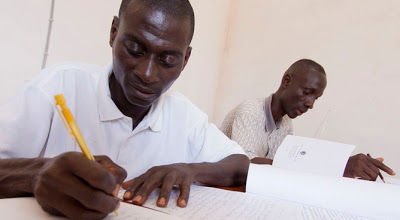Healed: Blind African Man Receives Sight, Becomes Bible Translator
Rafael Coli grew up in the rural village of Arame at the end of a long, rutted road in northwestern Guinea-Bissau, Africa. During the rainy season, the road becomes impassable; it’s safe to say Google “Street View” doesn’t zoom in here.
As a boy, Rafael helped harvest his family’s cashew crop. A former Portuguese colony, his country is, after all, the world’s fifth largest producer of cashew nuts, behind India, Ivory Coast, Vietnam and Brazil. The pear-shaped “false fruit” that the cashew tree produces contains a yellowish juice, a substance that is reminiscent of the days before the gospel took root in Rafael’s heart—before God fitted his feet for bringing the gospel of peace to his people in a form they could truly understand.
“I had a spiritual battle,” says Rafael, whose squinting, bloodshot eyes are a telltale sign he’s had trouble with his sight. “I dreamed during the night, and when I [woke up] in the morning I couldn’t see. Tears ran from my face and fell onto my shirt and it stained my shirt like cashew stains,” he adds. “After I became a Christian that ended.”
Rafael, 34, spent 11 long years in the army, specializing in topography for field artillery. “During that time when I was in the army I felt Satan’s oppression,” recalls Rafael.
His eye sickness began in 1998 from an unknown cause, and the debilitative disease, fraught with nightmares, seemed to flare up every payday. His military salary couldn’t satisfy the appetite of his medical expenses.
“My problem was that I always felt shame,” he says. “Sometimes I stayed in my room from morning until evening.”
Looking for God
It wasn’t until he left the army, started attending an evangelical church in 2009 and surrendered his life to Jesus, that Rafael’s life began to improve spiritually, socially and economically. In his dreams he began to see a person holding an open Bible, warding off the evil presence that afflicted him in his nightmares. His illness stopped and he is now in recovery. His paycheques don’t have to be spent at the pharmacy any longer. He credits all of this to his belief in Jesus Christ.
“At the evangelical church … I had the experience of looking for God,” says Rafael. “When I was learning to look for God, then I started to find freedom. This transformed my life completely.”
Today he is husband to Damiana and father of their three children. Since October 2010, he has also been one of five Guinean team members who are translating the Bible into the language of Jola-Bayote on behalf of approximately 3,000 speakers. The book of Mark is now completed, along with Luke and chapters one to 24 of Acts.
“Because Satan knew that [the translation project] was going to be here tomorrow, that is why I had that battle,” says a now victorious Rafael.
* * *
It is Sunday, Nov. 13, 2011, and the village of Arame’s first-ever church service for Bayote-speaking Christians is underway. A tin roof is no barrier to the memorized, a cappella words—formed on the lips of those unable to read or write their own language—that are being sent heavenward this morning. “Jesus is the Person who God sent,” they sing. “He died for us.”
Morning light filters in through honeycomb-like windows. The stiff, inanimate cement structure is temporarily brought to life as the worshipers sway to the rhythm of the music they are making: “My brothers, I will show you who saves. Jesus saves.”
Women dressed in colourful, traditional garb take turns dancing up the aisles. As they do, they are spurred on by the intensifying, rhythmic clapping of their fellow believers.
“I invite my brothers to come and follow Jesus.” More words begin their journey toward heaven, though the maps of Guinea-Bissau on the walls and the words themselves are reminders that their message will eventually reach the worshipers’ fellow countrymen.
The church service is only a one-time event—for now. Its purpose is to rally the community around the Jola-Bayote language project, and to cover the village in prayer.














































